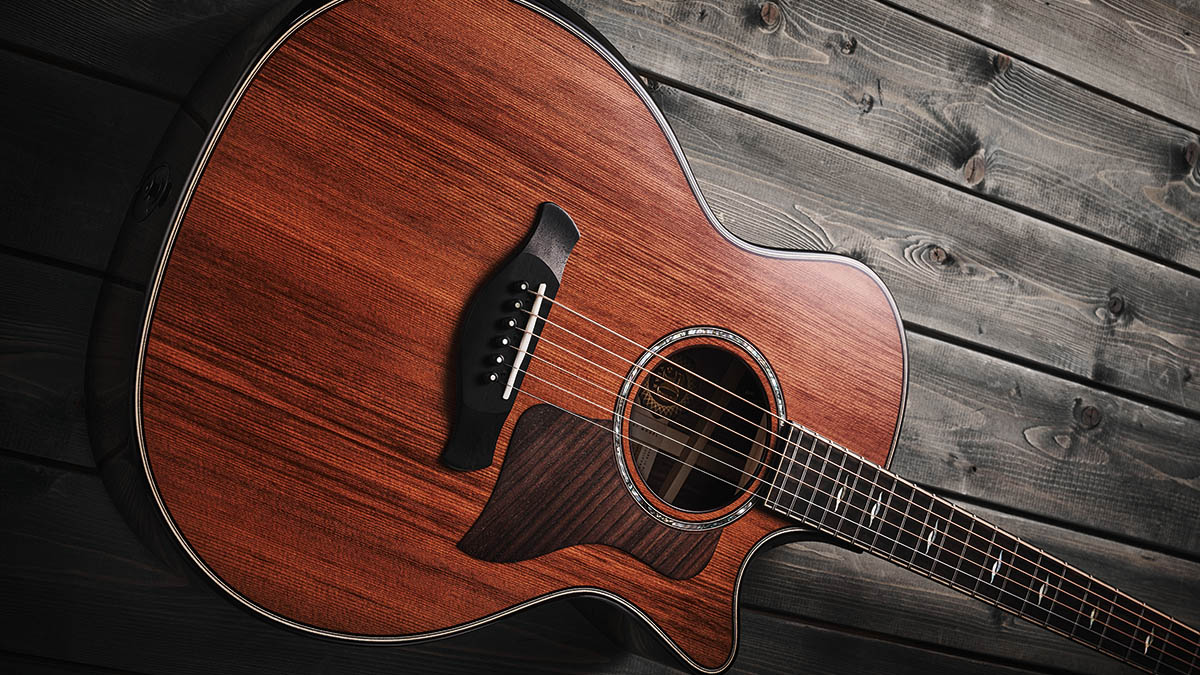
We’ve often said how the early to mid-1970s seemed to be a breeding ground for some very innovative ideas in the music world.
Those years saw the rise of progressive rock from bands like Yes, ELP, King Crimson, Pink Floyd and Genesis, after all. But there were shake-ups in the manufacturing industry, too. How about the first Boss chorus pedal and Marshall’s Master Volume guitar amplifiers, for instance?
But while all this was going on, a music store in San Diego saw the fusion of two minds that gave rise to a global acoustic guitar brand – Taylor Guitars. Bob Taylor and co-founder Kurt Listug were working in what has been described as a “hippie guitar store” called American Dream, owned by Sam Radding; when Sam decided to sell up, the pair teamed up and bought the business.
Fuelled by a mutual love for guitar building, Bob and Kurt began the transformation from local music store to what was to become one of the world’s best‑loved acoustic guitar manufacturers.
There’s been a lot of water under the bridge since those days – and some of that water was to yield timber for acoustic guitar tops, but more of that in a moment – and Taylor is celebrating its 50th anniversary this year in style.
Throughout the year the company will release what it describes as “a curated collection of limited-edition guitars celebrating the diversity of the Taylor line”, and the fun has already started with the guitar before us now.
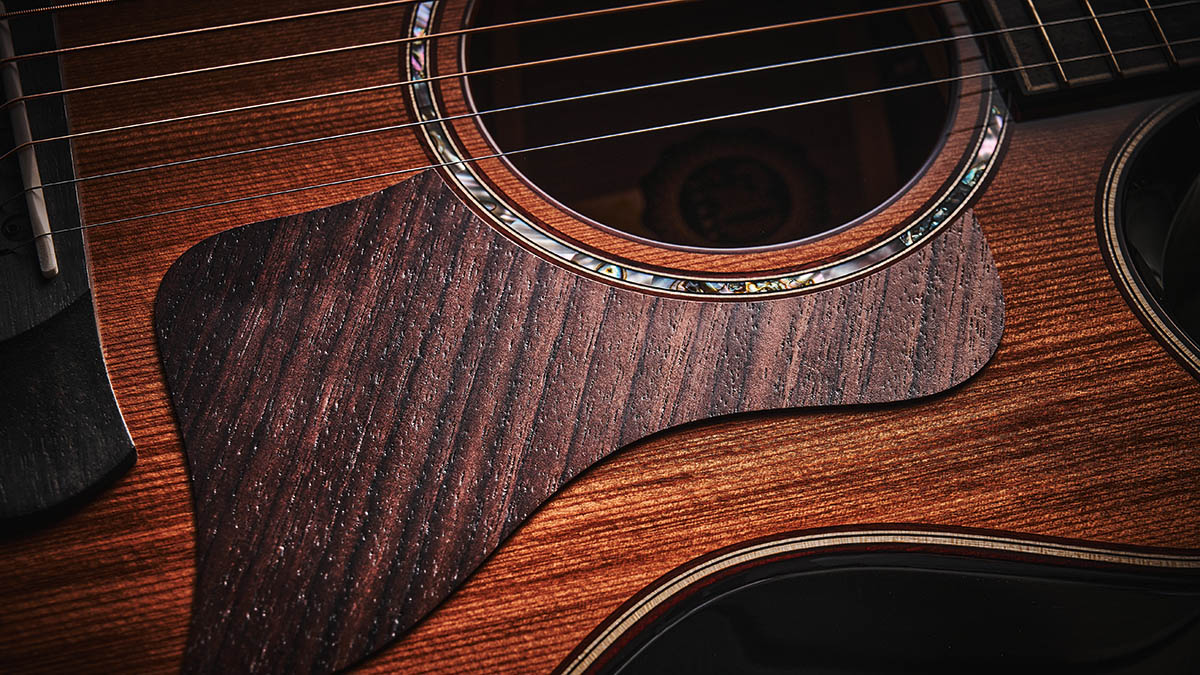
Limited to 1,974 apiece, the anniversary instruments so far include the sitka/walnut American Dream AD14ce-SB LTD right up to the flagship PS24ce LTD, which features some exquisite highly figured master-grade koa for its top, back and sides.
Our Builder’s Edition 814ce sits in the midrange, as far as pricing is concerned, but is nonetheless turned out in sinker redwood and Indian rosewood and includes what Taylor tells us is “an ultra-premium twist on our player‑favourite BE 814ce…”
If you find yourself wondering what on earth ‘sinker redwood’ can be, it’s basically thanks to the US logging industry of yore. Around 100 years or so ago, the industry took advantage of the rivers in Northern California to float tree trunks downstream to the saw mills.
It was a cheap form of transport, but there were casualties in that some of the logs sank to the bottom of the river and were considered gone and beyond reach. Fast forward to the technological future we now enjoy and this submerged timber is not only salvageable but is highly prized as a guitar-making wood.
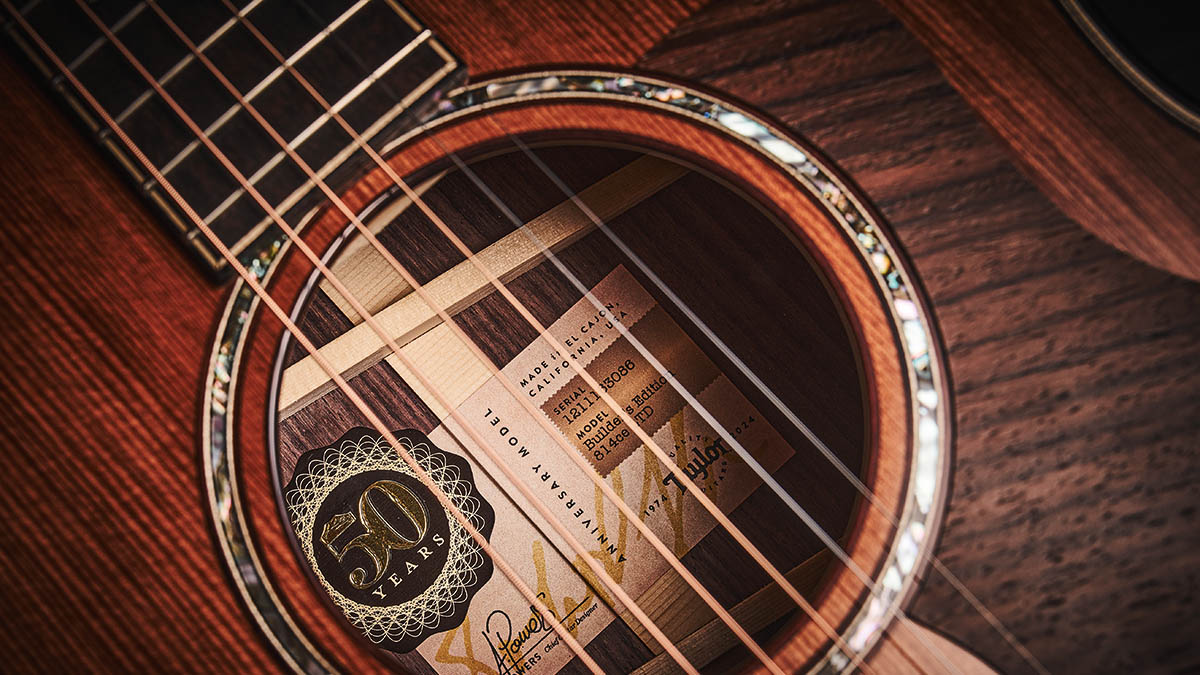
Why? Well, we’re not biochemists, but our understanding is that the minerals in the riverbed transforms the timber, lending it, says Taylor, “a rich spectrum of variegation, the result of colours uniquely imparted from silt and the mineral-rich water”, and that it produces “a tight grain with nice cross-grain stiffness, so it will tend to have a fairly bold response, with a brilliance complemented by warm overtones similar to cedar”. To put it plainly, tonally speaking, sinker redwood is like “cedar on steroids”.
In order to see exactly what effect being submerged for a century or so has had on the top wood for this 814ce, we’d better, erm, dive in and take a closer look…
First of all, let’s take a quick tour around the rest of the components that go to make up this very special 814ce. We’ve already discussed the redwood top, which is a ruddy brown in colour with darker seams streaking its surface.
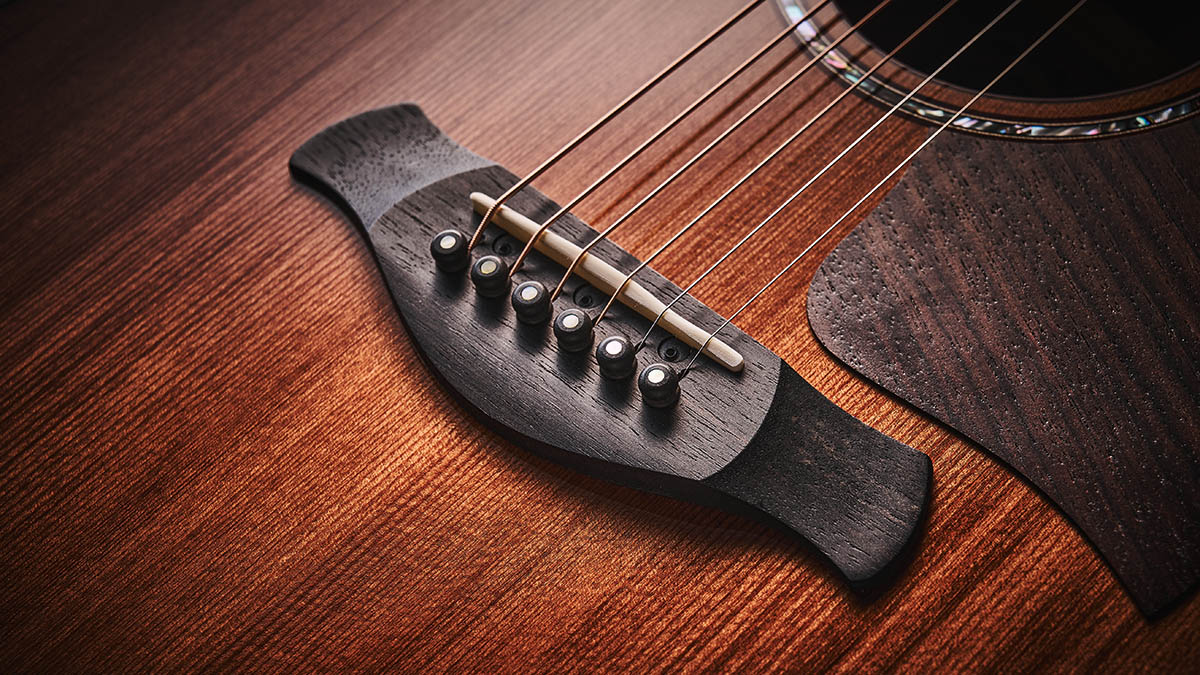
The pickguard is fashioned from nicely figured rosewood, which adds a touch of luxury to the guitar’s top, as does the rosette, which comprises a single ring of green abalone inlays bound with rosewood, maple and black purfling.
A closer look at the soundhole itself reveals a ring of dark rosewood lining the inner surface of its circumference. And the classy appointments don’t end there. The edges of the guitar’s top have been ‘chamfered’ (rounded over would be a better description), and both the cutaway and armrest are bevelled to enhance player comfort. No sharp edges to dig into your arm in this vicinity!
Looking through the soundhole, there’s a reminder that this is a 50th anniversary model by virtue of a sticker on the edge of the label inside – and while we’re here it’s worth mentioning that the 814ce benefits from Taylor’s innovative V-Class bracing system.
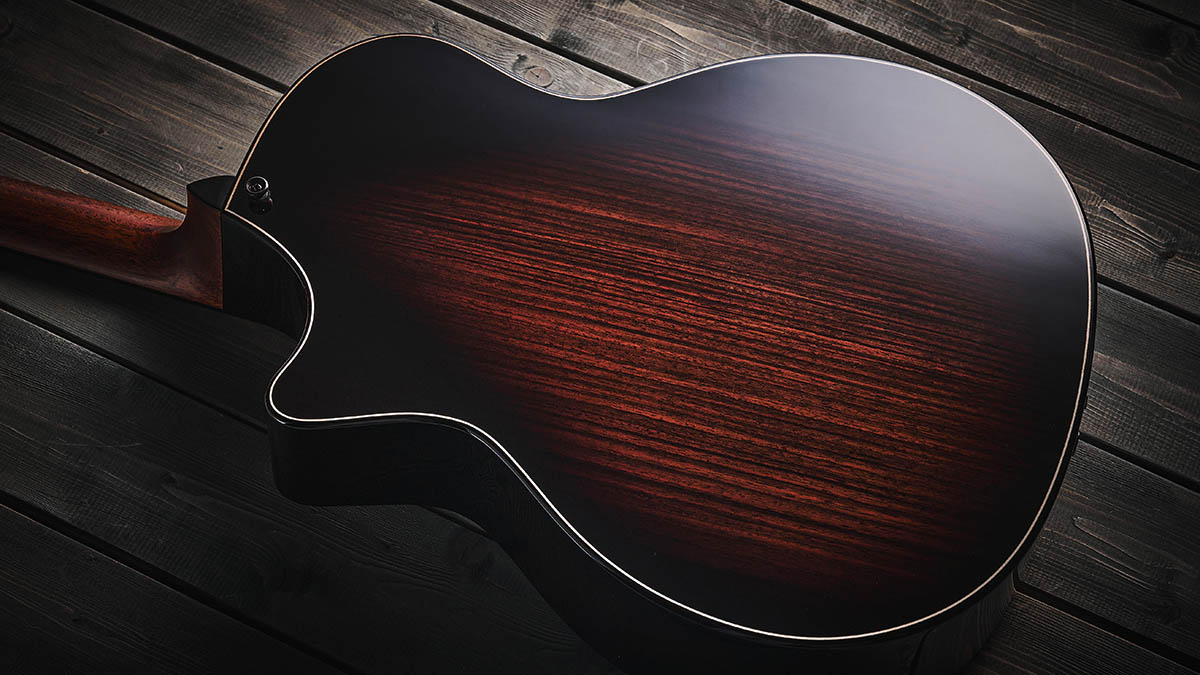
This particular bracing pattern, the brainchild of Taylor’s current CEO and chief designer Andy Powers, enhances tone and sustain and has proven itself in the past on the many Taylors that have passed through our hands.
Turning our attention to the back and sides of the guitar, we find Indian rosewood as a foil to that redwood top. Indian rosewood needs no introduction because its reputation as a superb tonewood is well known. Here, its presence is enhanced by a sort of darkburst effect to the back, adding yet another touch of grandeur to the anniversary proceedings.
The 814’s neck is neo tropical mahogany and the fretboard is Crelicam ebony from West Africa with Taylor’s ‘Element’ fingerboard inlays. Whereas you might expect the ebony here to be jet black, it has a brownish hue to it instead.
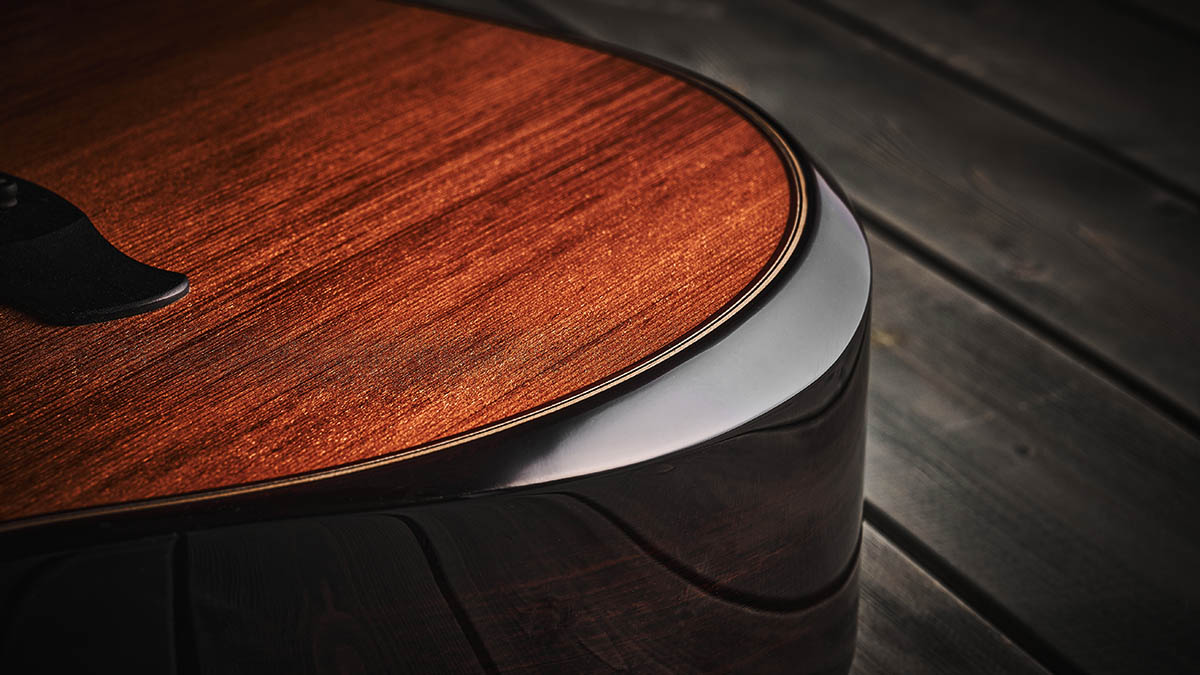
This might come as a surprise to hardcore traditionalists, but not all ebony is black and a lot of fine timber has been discarded in the past because guitar manufacturers have insisted on using the black variety, but ecological concerns – something very close to Taylor’s core beliefs – mean that the equally fine brownish variety is now in full use.
It’s easy to hear the influence the sinker redwood top has had on the richness of the entire tonal spectrum
Another surprise in the same region is that the neck is scarf-jointed below the headstock. Some purists believe this to be a mark of cost-cutting and, well, cheapness. But not only has scarf-jointing been proven to add strength to this very vulnerable area, it’s also another sound ecological process as, simply put, it conserves wood.
The 44.4mm wide Tusq nut sits under the headstock and antique-looking brass coloured Gotoh tuners, the 20 medium frets are finely finished and smooth as silk to the touch, and everything here yells class and quality. The 814ce certainly looks the business – let’s hear how it sounds.
Feel & Sounds
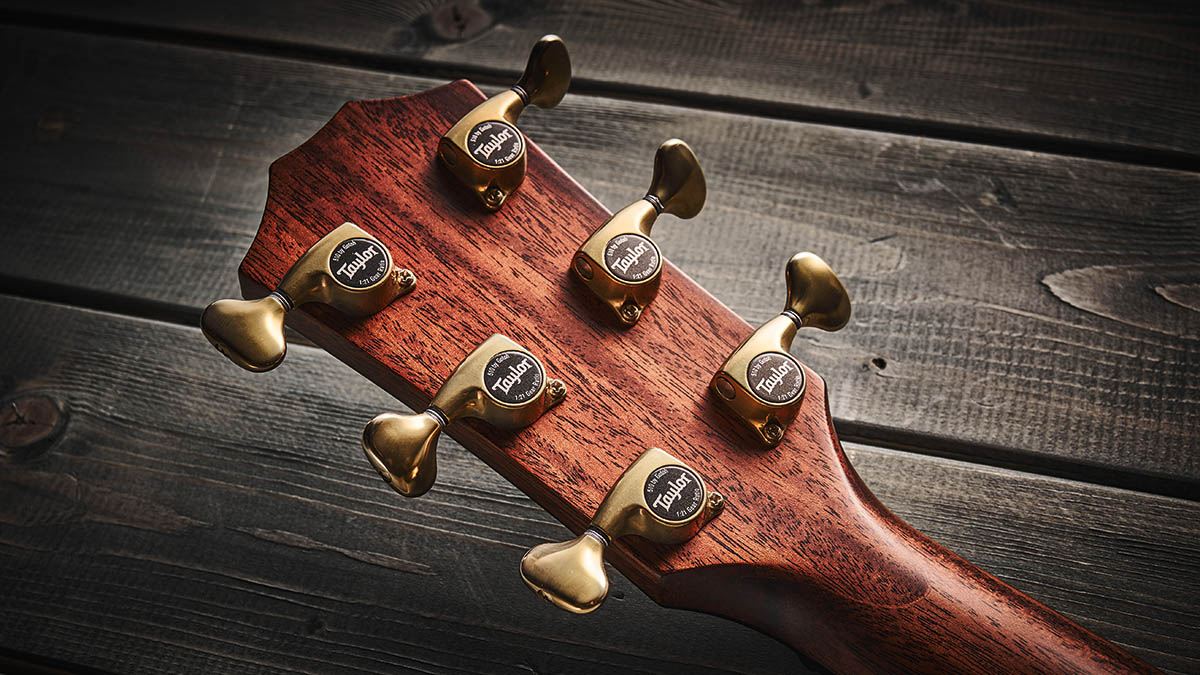
It’s safe to say that every Taylor that has come our way has shared one characteristic in that the feel of the necks and general setup are always spot on fresh out of the box, and that’s certainly the case here.
The neck profile is a comfortable wide-ish shallow C that sits in the hand perfectly and the satin finish feels superb and enhances smooth movement of the hand up and down the playing area. It’s a nicely balanced guitar, too, with no hint of neck heaviness when played sitting down.
Tonally speaking, everything you need is here. There is a richness and warmth to the entire tonal spectrum and it’s easy to hear the influence that the sinker redwood top has had in this department.
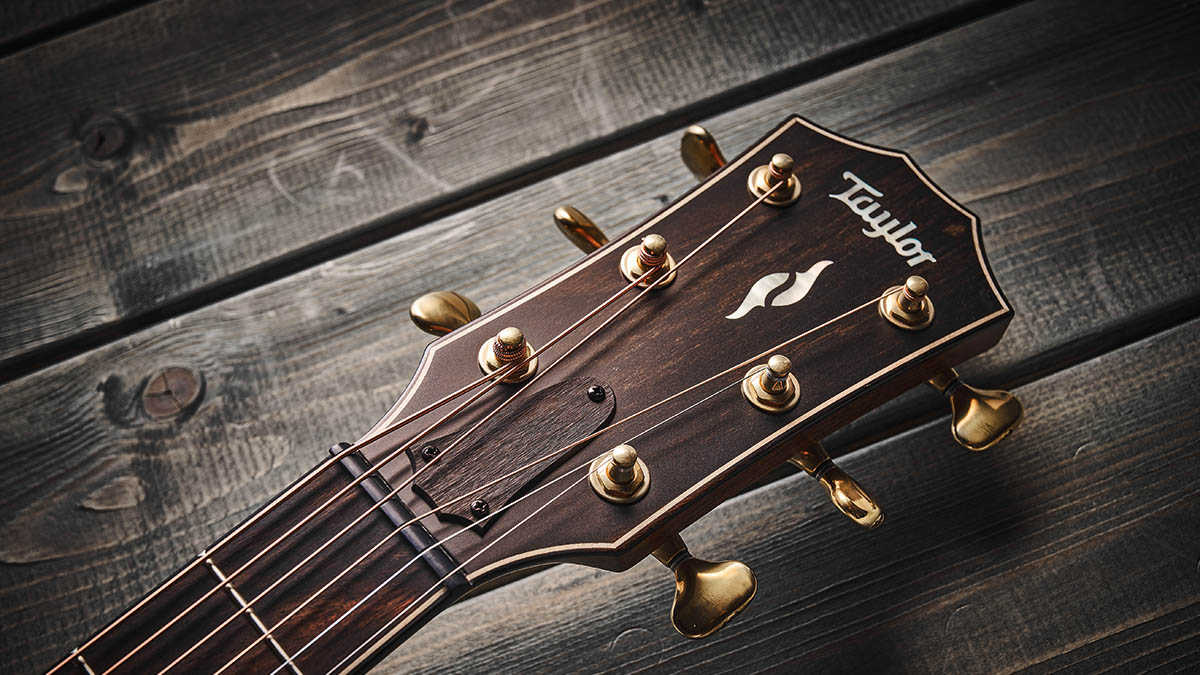
As we’ve said, Taylor describes it as a sort of turbo-charged cedar and we’d agree. Whereas cedar is suited to a light touch – and as such is known to be a fingerstylist’s favourite in this respect – the redwood brings an additional shimmering edge to the sound.
Played gently it responds well, producing a very melodic subtlety without a trace of wimping out. But switching over to bashing out some campfire chords you get the impression that there’s still a reserve of toneful power waiting to be tapped into.
It can be loud but never brash and shrieky. It’s quite likely that the years will favour the tone even more as the timbers wake up and align themselves, but what’s here already is pretty impressive.
The 814ce comes equipped with Taylor’s Expression System 2, which we’ve always found to be one of the easiest pickup/preamp combos to use. True to form, when we put the 814 through our trusty AER Compact 60 we kept the preamp controls on both the guitar and the amp completely flat and the sound was perfectly usable as it was.
In other words, there was plenty of room for individual tweaking to taste. The electric sound represented what we had previously heard acoustically very well, meaning that you’re ready to take to the stage with the guitar pretty much straight out of the case and with the absolute minimum of fuss.
Verdict
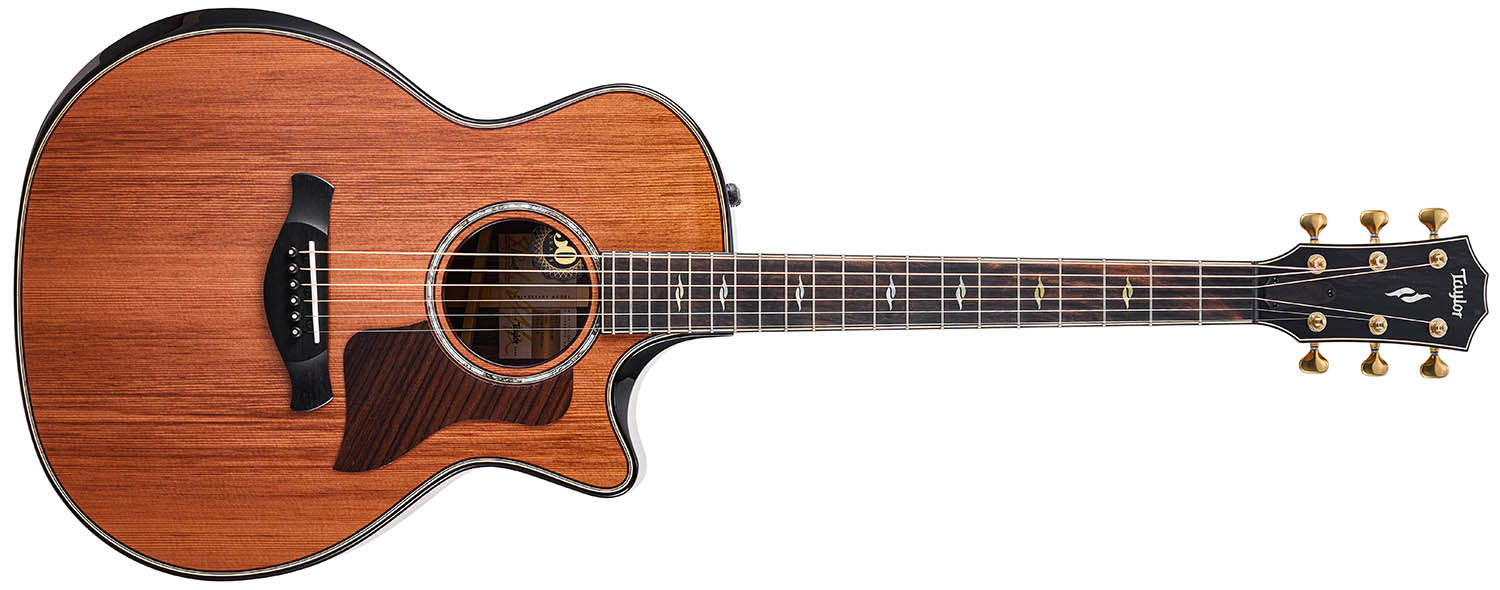
Needless to say, we are very impressed with this special anniversary Builder’s Edition. From its good looks and thoughtful features (you never know you need a bevelled armrest until you’ve tried a guitar that has one), to its ability to suit everything from gentle fingerstyle to vigorous strumming means that it would be a welcome addition to any guitar collection.
Specs
- PRICE: $4,999 / £5,939
- ORIGIN: USA
- TYPE: Grand Auditorium
- TOP: Sinker redwood
- BACK/SIDES: Indian rosewood
- MAX RIM DEPTH: 117.5mm
- MAX BODY DEPTH: 406mm
- NECK: Neo-tropical mahogany
- SCALE LENGTH: 648mm
- TUNERS: Gotoh
- NUT/WIDTH: Tusq/44.4mm
- FINGERBOARD: West African Crelicam ebony
- FRETS: 20
- BRIDGE/SPACING: Ebony (Micarta saddle)/54mm
- ELECTRICS: Taylor Expression System 2
- WEIGHT (kg/lb): 2.13/4.7
- LEFT-HANDERS: No
- FINISH: Gloss
- CONTACT: Taylor Guitars







